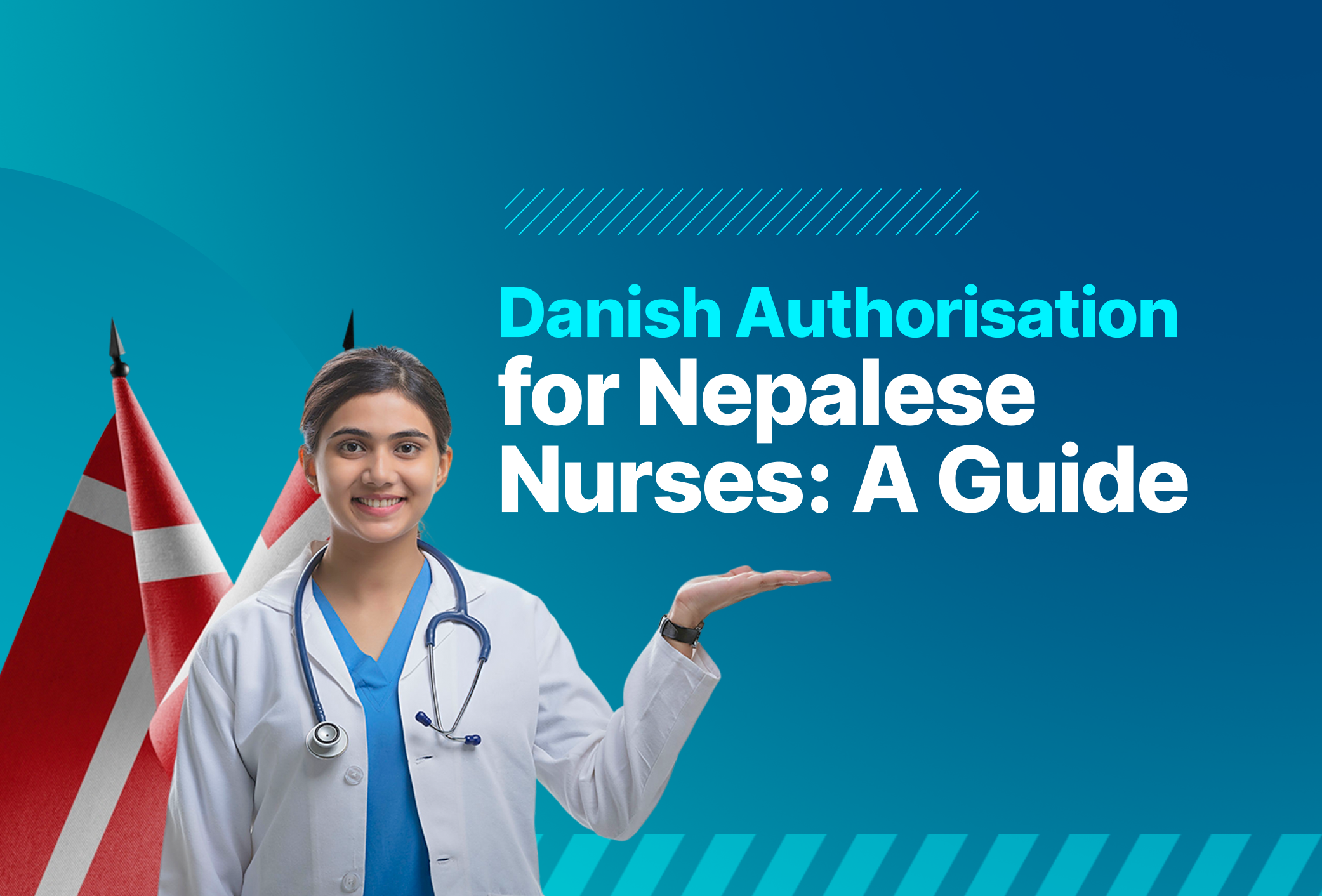18 Jun 2025
NclexHub

Are you a registered nurse in Nepal dreaming of a better future in Europe? If so, Denmark might be the perfect destination for your next career move. With its advanced healthcare system, attractive salary packages, and strong demand for skilled nurses, Denmark offers incredible opportunities for those who are willing to meet the requirements - starting with the Danish Nursing Authorization.
This blog offers a step-by-step guide to the Danish Authorization process for Nepali nurses, including eligibility, costs, benefits, and personal tips to help you make an informed decision and take your career abroad with confidence.
Table of Contents
Danish Authorization for Nurses from Nepal: 2025
- Introduction
- Why Work as a Nurse in Denmark?
- Who Needs Danish Authorization?
- Eligibility Requirements for Danish Authorization from Nepal
- Educational Qualification
- Professional Registration
- Language Proficiency
- Work Experience (Optional but Helpful)
- Danish Authorization Process for Nurses from Nepal
- Step 1: Application for Assessment
- Step 2: Educational Assessment
- Step 3: Language Requirements
- Step 4: Adaptation and Training (If Required)
- Step 5: Temporary Work Permit (Optional)
- Step 6: Final Authorization
- Financial Costs Involved in Danish Authorization
- Life as a Nepali Nurse in Denmark
- Working Conditions
- Salary Range
- Living in Denmark
- Conclusion
- FAQs - Danish Authorization for Nurses from Nepal
Introduction
In recent years, Denmark has emerged as a popular destination for healthcare professionals seeking better opportunities and a high standard of living. Known for its excellent healthcare system, strong workers’ rights, and high salaries, Denmark welcomes qualified foreign nurses - including those from Nepal - to work in its public and private healthcare sectors. However, to legally practice nursing in Denmark, foreign trained nurses must obtain Danish authorization regulated by the Danish Patient Safety Authority (Styrelsen for Patientsikkerhed) through a structured process.
This comprehensive guide is tailored specifically for Nepali nurses who dream of working in Denmark.
Why Work as a Nurse in Denmark?
Working as a nurse in Denmark is not just about earning a better salary - it’s about professional growth, work-life balance, and long-term stability. Here are ten compelling reasons why Denmark is one of the best countries in the world for nurses, especially for those coming from Nepal and other non-EU nations:
1. World-Class Healthcare System
Denmark boasts one of the most efficient and equitable healthcare systems in the world. As a nurse, you’ll work in a well-organized, patient-centered environment that emphasizes quality care, hygiene, and advanced technology. Nurses are respected members of the healthcare team.
2. High Salary and Strong Social Benefits
Danish nurses earn competitive wages, typically ranging from DKK 28,000 to DKK 35,000/month for entry-level positions - equivalent to NPR 550,000 - 700,000 per month. In addition, nurses benefit from:
- Paid vacation (up to 6 weeks/year)
- Sick leave and parental leave
- Free public healthcare
- Pension contributions
- Overtime pay and night shift bonuses
3. Career Growth and Specialization
Opportunities Denmark encourages continuous education and specialization. After authorization, nurses can pursue:
- Specializations (psychiatric nursing, pediatric nursing, surgical nursing, etc.)
- Master’s degree programs
- Management and research roles
4. Work-Life Balance
Danish work culture emphasizes balance, family time, and mental well-being. Nurses typically work:
- 37 hours per week
- Rotating shifts with proper breaks
- Paid holidays and personal development days
This makes it easier to manage both professional duties and family responsibilities.
5. Pathway to Permanent Residency and Citizenship
After working in Denmark for a few years with a valid work permit, you may qualify for:
- Permanent residency (usually after 4 - 8 years)
- Danish citizenship (after 9 years, or earlier for special cases)
- Spouse and family reunification opportunities
6. Safe, Clean, and Green Environment
Denmark ranks among the world’s safest and happiest countries. It offers:
- Low crime rates
- Clean cities and air
- Beautiful parks and coastlines
- Excellent public transport and cycling infrastructure
This makes it ideal for individuals and families looking to settle in a peaceful, high-quality environment.
7. Focus on Communication and Ethics
Nursing in Denmark is not just technical. You are trained in:
- Ethical decision-making
- Interdisciplinary teamwork
- Patient-centered care
- Empathetic communication
This helps you grow not only as a professional but as a human being.
8. Demand for Skilled Nurses
Like many European countries, Denmark faces a nursing shortage due to its aging population. This means:
- High demand for qualified nurses
- More job security
- Easier entry routes for foreign-trained professionals
9. Free Education for Further Study
Once authorized and settled, you may be eligible for tuition-free higher education in Denmark. Many nurses go on to study:
- Health sciences
- Public health
- Nursing leadership and management
This opens doors to new career paths in administration, education, and policy.
10. International Work Experience
Working in Denmark offers exposure to global healthcare standards. It also boosts your chances of working in other Nordic or EU countries (after years of residence or additional certifications).
Who Needs Danish Authorization?
Anyone who has obtained their nursing qualifications outside the EU/EEA, including Nepal, must go through an official process to have their professional qualifications recognized and approved by the Danish Patient Safety Authority (Styrelsen for Patientsikkerhed).
Eligibility Requirements for Danish Authorization from Nepal
To begin the Danish authorization process, Nepali nurses must meet the following criteria:
1. Educational Qualification
- Must have completed a Bachelor of Nursing or equivalent program.
- The course should be a recognized program of at least 3 years.
2. Professional Registration
- You must be registered with the Nepal Nursing Council (NNC).
- A Good Standing Certificate from NNC is required.
3. Language Proficiency
- You will need to demonstrate proficiency in the Danish language (not English).
- A high level of Danish is essential for patient communication and integration into the healthcare system.
4. Work Experience (Optional but Helpful)
- Having 1–2 years of clinical experience can strengthen your application.
Danish Authorization Process for Nurses from Nepal
Step 1: Application for Assessment
Apply to the Danish Patient Safety Authority for an initial assessment of your qualifications.
Required Documents for Application:
- Completed application form
- Copy of your passport
- Bachelor of Nursing degree certificate and transcript
- NNC Registration Certificate
- Good Standing Certificate (issued within the last 3 months)
- Work experience letters (optional)
- Updated CV
- Proof of name change (if applicable)
- Translation of all documents into Danish or English (by an authorized translator)
- Receipt of application fee (approx. DKK 1,295 - NPR 26,730)
Note: Only certified and legally translated documents are accepted.
Step 2: Educational Assessment
The authority will compare your education with the Danish nursing education standard.
This evaluation considers:
- The structure and length of your education
- Course content and clinical training
- Relevance to Danish standards
If major differences are found during the comparison of your education with the Danish nursing education standard, you may be required to:
- Take additional courses
- Participate in a compensatory program
- Pass professional exams
Step 3: Language Requirements
To obtain full authorization, you must pass a recognized Danish language test:
|
Language Test |
Minimum Requirement |
|---|---|
|
Prøve i Dansk 3 |
Grades: 10 in one module, 7 in the others |
|
Studieprøven |
Must pass |
Language Test Preparation Tips:
- Start learning Danish early, even before applying.
- Use platforms like Duolingo, Babbel, and local language schools.
- Consider taking intensive courses like Danskuddannelse 3.
Step 4: Adaptation and Training (If Required)
If your education is deemed not fully equivalent, you will be asked to:
- Complete a compensatory employment period (typically 6–9 months).
- Work in a Danish hospital or care home under supervision.
- Focus on clinical practice, communication, and familiarity with Danish healthcare culture.
This is also called a praktikophold (internship).
Step 5: Temporary Work Permit (Optional)
In some cases, you may be granted a temporary authorization to work under supervision while completing adaptation or language requirements. This can be a good way to gain Danish experience and earn income.
Step 6: Final Authorization
Once all requirements are met (assessment, adaptation, and language), you will receive:
- Permanent Danish Authorization as a nurse
- Registration in the Danish Health Registry (Sundhedsvæsenets Autorisationsregister - SAR)
Tadaa ! You are now legally allowed to work as a registered nurse in Denmark.
Financial Costs Involved in Danish Authorization
You will incur the following costs for your Danish Authorization from Nepal and moving to Denmark:
|
Categories |
Estimated Costs (DKK / NPR) |
|---|---|
|
Application fee |
DKK 1,295 (NPR 26,730) |
|
Document Translations |
NPR 15,000 - 30,000 |
|
Danish Language Course |
NPR 50,000 - 100,000+ |
|
Language Exam Fees |
DKK 1,000 - 1,500 (NPR 20,000 - 30,000) |
|
Visa Application Fee |
DKK 1,890 (NPR 39,000) |
|
Proof of Funds Requirements |
DKK 40,734 (NPR 840,000) |
|
Flight Tickets (One way) |
NPR 90,000 - 150,000 |
|
Miscellaneous |
NPR 20,000 - 50,000 |
Life as a Nepali Nurse in Denmark
Working Conditions
- 37-hour work weeks
- High nurse-to-patient ratio
- Work in hospitals, elderly care, psychiatric centers, and home care
- Emphasis on teamwork, ethics, and communication
Salary Range
- Average starting salary: DKK 28,000–35,000/month (~NPR 560,000+)
- Salary increases with experience and specializations
Living in Denmark
- Safe and clean environment
- Access to free healthcare and education
- Affordable accommodation (shared housing, dorms)
- Opportunities to bring family (after settling)
Pros and Challenges of Becoming a Registered in Nurse in Denmark
|
Pros |
Challenges |
|---|---|
|
High Salary |
Lengthy Process (1 - 2 Years) |
|
Permanent Residence Pathways |
Requires Danish Proficiency |
|
Free Healthcare and Education |
Expensive Country |
|
Career Growth Opportunities |
Bureaucratic Paperwork |
Conclusion
While the path to becoming a registered nurse in Denmark from Nepal is not easy, it is definitely achievable with careful planning, dedication, and language preparation. The reward - a fulfilling, high-paying career in a modern healthcare system is worth the effort. For Nepali nurses willing to invest time and energy into their professional development, Denmark offers a bright and stable future.
For NCLEX Eligibility & Requirements, click here.
We offer the best NCLEX preparation in Nepal and can help you to make your professional development journey more fruitful. If you need our support, feel free to contact us.
Also Read: How to Get a Nursing License in the USA
FAQs - Danish Authorization for Nurses from Nepal
1. Can I apply without Danish language skills?
Yes, you can apply but authorization is only granted after you meet the language requirements.
2. What is an authorization visa in Denmark?
If you are a citizen of a country outside the Nordic region, the EU/EEA or Switzerland, the Danish Authorization is required to apply for residence and work permit.
3. How long does it take to get a Danish Patient Safety Authority?
The Danish Patient Safety Authority (DPSA) typically processes applications within about 6 months. However, processing times can vary depending on the complexity of the application and the individual's circumstances.
4. How do I get a work authorization in Denmark?
People who wish to work in Denmark must apply for a work visa and residence permit. To qualify for a Danish work visa, you need to find a job and receive an official employment letter from a Danish employer. The visa application process itself is relatively quick and easy.
5. Is IELTS required for Danish Authorization?
No, Danish language proficiency is mandatory, not English.
6. Can I work during the adaptation program?
Yes, often you’ll be employed under a supervised license.


